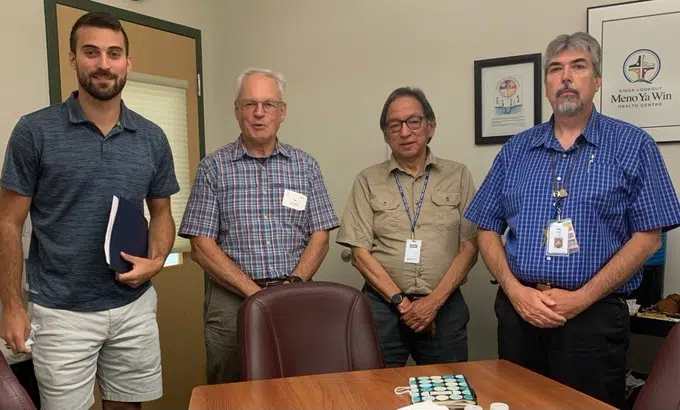
Eric Melillo visit to Sioux Lookout Meno Ya Win Health Centre (Twitter)
The Conservative MP for Kenora believes the federal government should be more actively involved in working with provinces to solve the staffing shortage crisis in the health care field.
Eric Melillo says every premier in Canada has called for help.
There are growing calls from Ontario labour movements and politicians urging the premier to repeal wage restraint legislation that they say is harming efforts to recruit and retain more nurses.
Melillo believes certain changes on the national front would help provide some relief for exhausted staff and avoid emergency room closures.
Melillo notes a couple of measures can be done immediately.
He says those solutions include increasing health care transfers to the provinces and changing the rules to make it easier for Canadians to work across the country.
Melillo notes, “For example, a health care worker in Manitoba should be able to come and work in Ontario without any barriers.”
He adds the government should, “Make it easier for immigrants who are trained in the medical field to come to Canada and have their qualifications recognized.”
Melillo stresses a long-term plan is also needed.
“Specifically within our region, we know that housing and a number of other factors go into our inability to keep people in the region and those are the things we need to address as well. It’s a bit outside the health care scope but of course it’s all connected.”
Melillo says he’s spent some time this summer to meet with front-line workers and hospital staff to hear their concerns and challenges.
Meantime, Thunder Bay-Rainy River Liberal MP Marcus Powlowski says he plans on connecting with the federal government to address shortages of doctors for the region.
Powlowski has a series of points he’ll be making to both the provincial and federal governments, along with the College of Physicians and Surgeons;
-Have the federal government establish a national licensure for doctors. Licensing doctors in only one province at a time makes it much more difficult for doctors in one province to fill gaps in another.
-Have the province of Ontario make Practice Ready-Assessments (PRAs) available for international medical graduates. PRAs allow international medical graduates to practice for twelve weeks as a doctor under the supervision of a Canadian doctor. After the twelve weeks, physicians are eligible for licensure. While most provinces allow PRAs and use them to address doctor shortages in rural areas, Ontario has not adopted this system.
-Have the College of Physicians of Ontario increase the number of residency positions, especially family practice residency for foreign graduates, including in rural areas. The more students that can obtain a residency, the more doctors we will produce. These residencies may require graduates to then practice in rural areas.
-Have the federal and provincial governments work together to allow doctors in certain countries practice in Canada without further accreditation or schooling. For example, Australia currently allows Canadian doctors to practice there. There are many countries with medical schools that are on-par with Canada’s schools. To require that doctors from these countries take the same courses again in Canada is a major deterrent for attracting doctors in Canada.
-Increasing the number of people studying to become nurse practitioners or physician assistants.
He plans to formally share his plan with the Minister of Health in early Fall.
(With files from Katie Nicholls)
Today Mayor Fred Mota and I visited the Margaret Cochenour Memorial Hospital in Red Lake.
Thank you to Meghan Gilbart and Pat Delf for providing an update on current shortages and identifying areas where the federal government should assist. pic.twitter.com/4bDDi3HzgQ
— Eric Melillo (@Eric_Melillo) July 15, 2022
Very informative discussion this morning at the Dryden Regional Health Centre. Thank you for taking the time to provide an update on current healthcare challenges. pic.twitter.com/nr3H9bk8KL
— Eric Melillo (@Eric_Melillo) July 22, 2022



